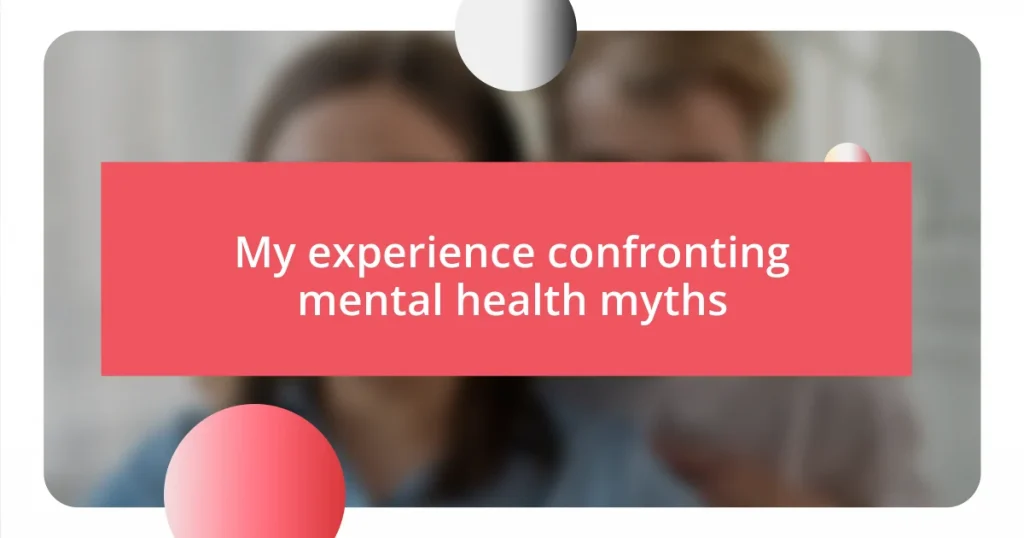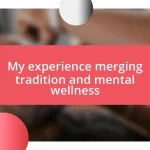Key takeaways:
- Mental health myths, such as the belief that mental illness is a sign of weakness, can prevent individuals from seeking help and understanding mental health issues.
- Therapy is beneficial for everyone, not just those with severe problems; a holistic approach to mental health often includes therapy, support, and lifestyle changes.
- Sharing personal experiences and resources helps dismantle misconceptions about mental health, fostering a culture of openness and support.
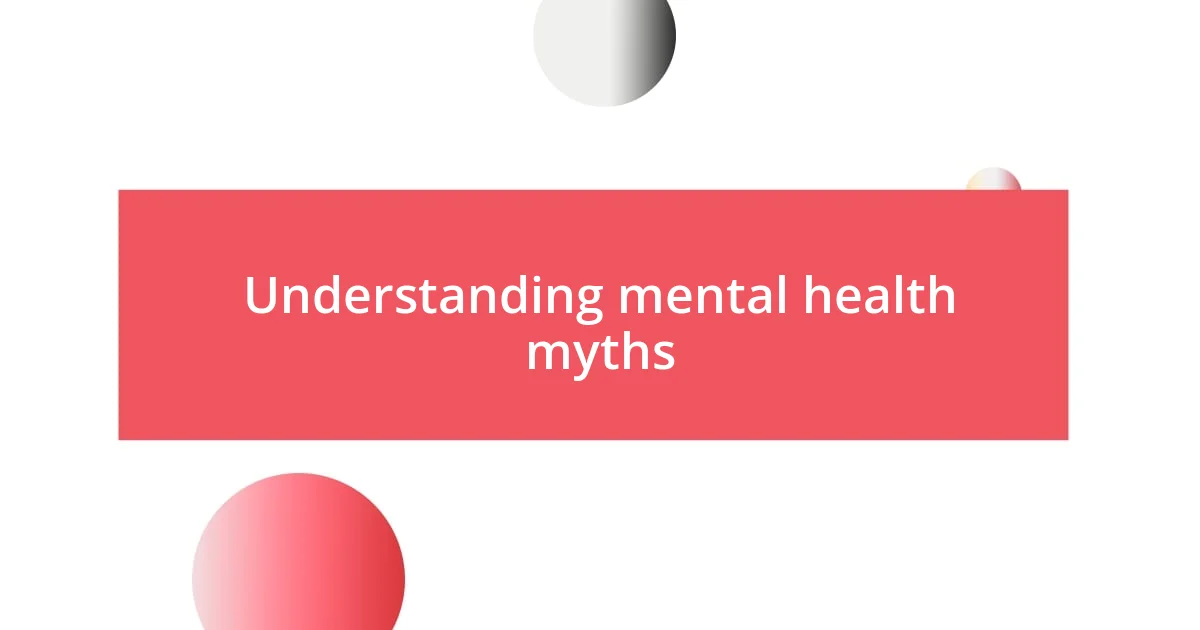
Understanding mental health myths
One of the most widespread mental health myths is the idea that mental illness is a sign of weakness. I remember the first time someone said this to me; it was jarring. This misconception can leave individuals feeling ashamed and reluctant to seek help. Why should we equate mental struggles with personal failure?
Another common myth suggests that therapy is only for those with severe issues. I used to believe that reaching out meant I had to hit rock bottom first. The truth, however, is that therapy can be beneficial for anyone, regardless of their struggles. Think about it: why wouldn’t we want to work through our thoughts and emotions proactively?
Mental health myths can distort our understanding and affect our relationships. I once found myself in a conversation where someone dismissed depression as just “a phase.” This perception can prevent us from truly comprehending what someone is going through. Why can’t we extend the same empathy we offer to physical health challenges to mental health? The more we educate ourselves, the better we’ll be at supporting ourselves and each other.
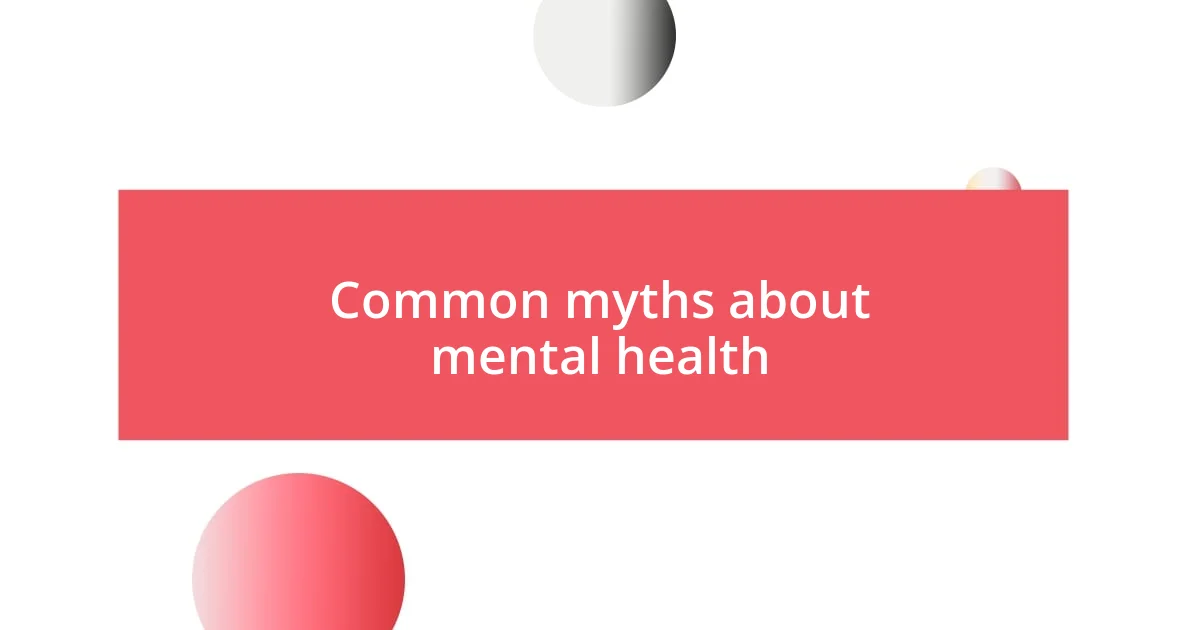
Common myths about mental health
One particularly misleading myth is that mental health disorders are rare and only affect a certain type of person. I used to think that mental illness was something that happened to others, not to someone like me. When I finally opened up about my struggles, I was surprised at how many people around me resonated with the conversation, highlighting that it’s far more common than we realize.
Another pervasive myth is that medication is the only solution for mental health issues. I once believed that turning to medication meant I was giving up or admitting defeat. Through my journey, I learned that while medication can be helpful for some, it’s often just one part of a multifaceted approach that can include therapy, lifestyle changes, and support systems. Why should we limit our toolkit for mental wellness when there are so many options available?
It’s also a misconception that people with mental health challenges are always unpredictable or dangerous. This stereotype can be damaging and isolating. Reflecting on my experiences, the reality is that individuals facing mental health difficulties often seek acceptance, understanding, and normalcy in their lives. If we could just see beyond the stigma, we would realize that everyone deserves compassion and support.
| Mental Health Myth | Reality |
|---|---|
| Mental illness is a sign of weakness. | Mental health challenges affect everyone, regardless of strength. |
| Therapy is only for severe issues. | Seeking therapy can benefit anyone, at any stage of life. |
| Medication is the only solution. | Recovery often requires a combination of therapy, support, and lifestyle changes. |
| People with mental health issues are dangerous. | Most individuals are seeking understanding, not conflict. |
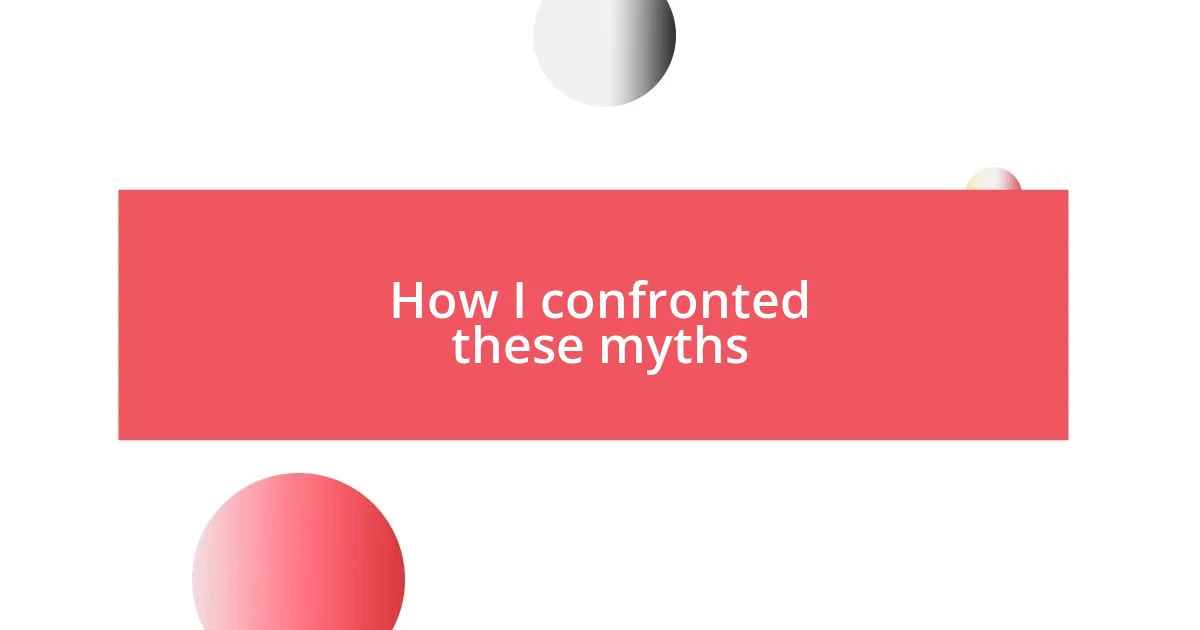
How I confronted these myths
Confronting these myths was a journey, and I realized that a personal approach was key. Whenever I encountered someone perpetuating a misconception, I tried sharing my own experiences openly. It was incredible to see how vulnerability can dismantle defenses and lead to deeper conversations. For instance, when I addressed the idea that therapy was only for the severely troubled, I told a friend how just having a soundboard helped me prioritize my emotional health and navigate everyday stressors.
- I shared my story: I found that when I spoke up about attending therapy for general life challenges, it sparked interest rather than judgment.
- I challenged assumptions: I often invited friends to share their thoughts on therapy, fostering an environment where we could discuss mental health openly.
- I provided resources: By sharing articles and personal anecdotes, I provided a more informed perspective, making it easier for others to see that mental health is universal.
Each interaction taught me that confronting these myths is not just about correcting misinformation; it’s about connecting and building understanding. It’s about creating a space where we all feel comfortable to express ourselves. Remembering the emotions and uncertainty I felt when starting this journey kept me motivated to continue the conversation.
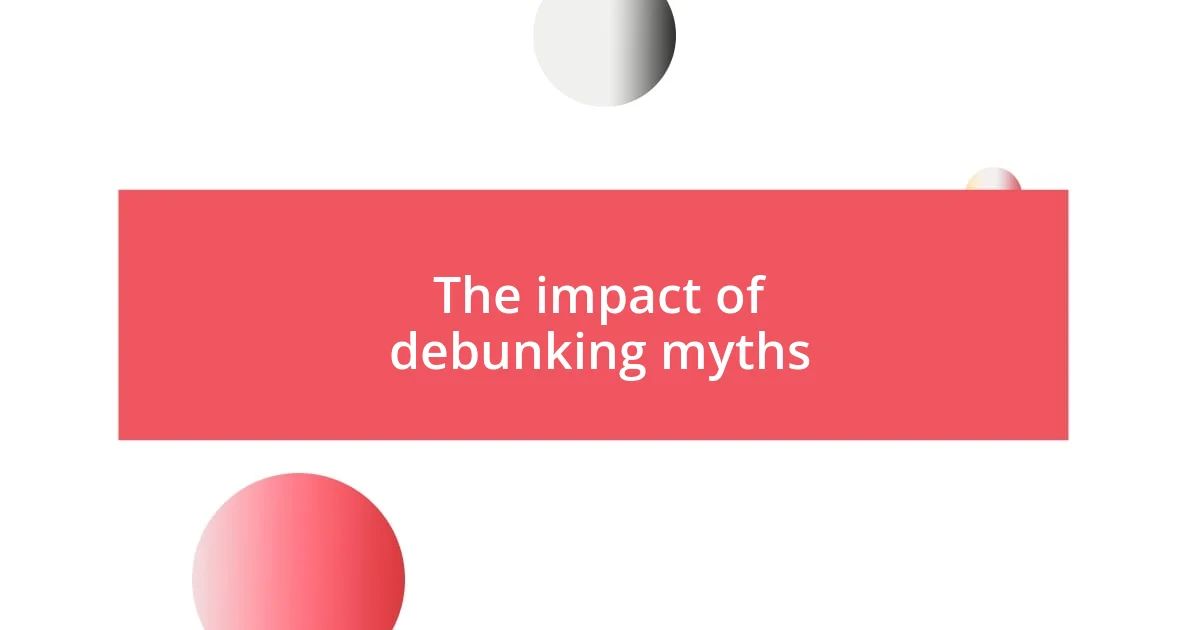
The impact of debunking myths
Debunking mental health myths can significantly shift our understanding of these issues, promoting a culture of openness and acceptance. When I shared insights about my own struggles, it dawned on me that many people felt ashamed to express their own feelings—simply because they thought they were alone. Have you ever wondered how many others are holding back their thoughts for fear of judgment? The moment I broke that silence, I saw relief wash over faces, like finally letting out a breath they didn’t know they were holding.
The ripple effect of debunking these misconceptions is profound. For instance, by explaining that seeking therapy isn’t just for severe issues, I encouraged a close friend who had been hesitant to pursue help. I could sense her struggle with feeling “weak” for needing support; once she learned that therapy can be part of healthy living, it empowered her to take action. What if we all viewed seeking help as a strength, rather than a weakness? Sharing stories can create a shared understanding that dissolves the stigma surrounding mental health.
Furthermore, dismantling these myths creates a safer space for dialogue. I’ve seen firsthand how discussions around mental health allow us to connect on a deeper level. It’s not just about correcting misconceptions; it’s about building bridges. When we’re willing to explore difficult topics, we pave the way for healing—not just for ourselves, but for those around us too. Each shared experience adds a thread to the tapestry of understanding, showing that our mental health journey isn’t a solitary one.
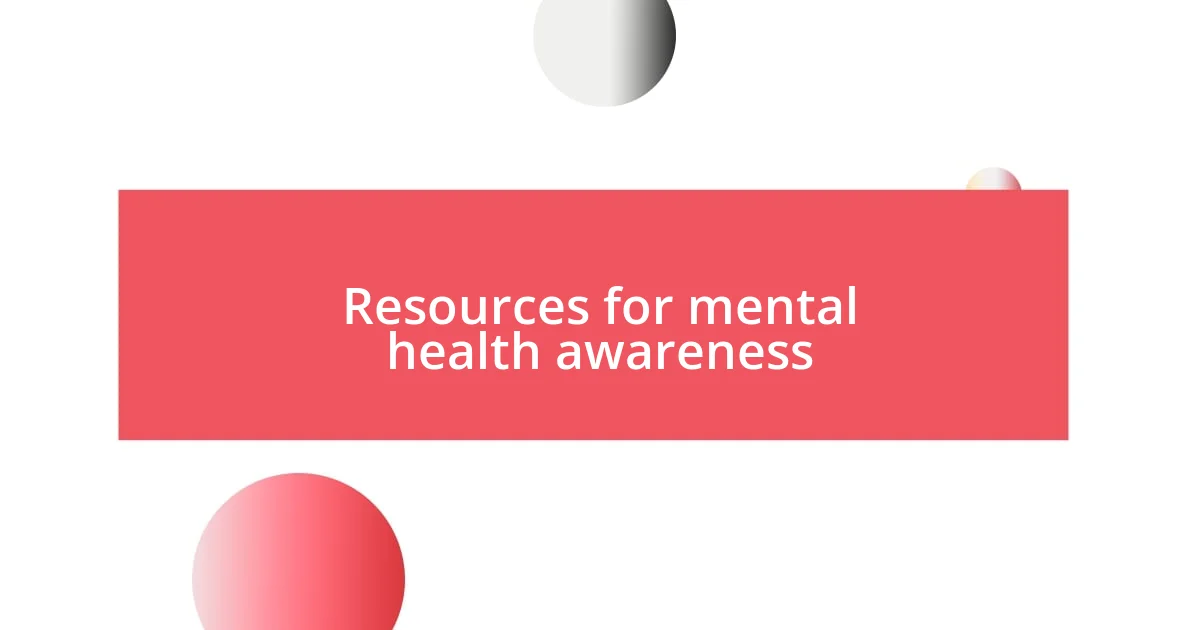
Resources for mental health awareness
When it comes to mental health awareness, a treasure trove of resources exists to guide us. I remember stumbling upon a website dedicated to mental health education; it opened my eyes to so many statistics and facts that I had previously underestimated. Isn’t it fascinating how a single article can change your outlook? There are platforms like Mental Health America and National Alliance on Mental Illness (NAMI) that not only provide data but also offer community support and channels for advocacy, reminding us that we are not alone in our struggles.
Books can also serve as powerful resources in this quest for awareness. One book that struck a chord with me was “The Body Keeps the Score” by Bessel van der Kolk. It resonated deeply because it highlighted the connection between trauma and mental health in an accessible way. Have you ever read something that felt like it was written just for you? This book encouraged me to confront my own experiences with trauma, and it made me realize just how important it is to approach these subjects with empathy and understanding.
Moreover, I found that podcasts are a dynamic way to explore mental health topics. There are podcasts like “Therapy Chat” and “Mental Illness Happy Hour” that dive into various aspects of mental health through interviews and honest discussions. I often listen to these while commuting, and it feels like I’m part of an enlightening conversation. Who wouldn’t want to feel part of a community of sharing and learning? These resources continue to enrich my understanding and help destigmatize mental health, proving that awareness doesn’t have to be daunting; it can be engaging, insightful, and, most importantly, supportive.










